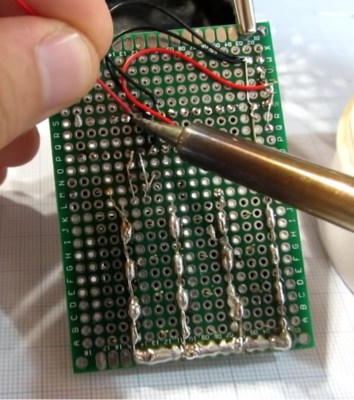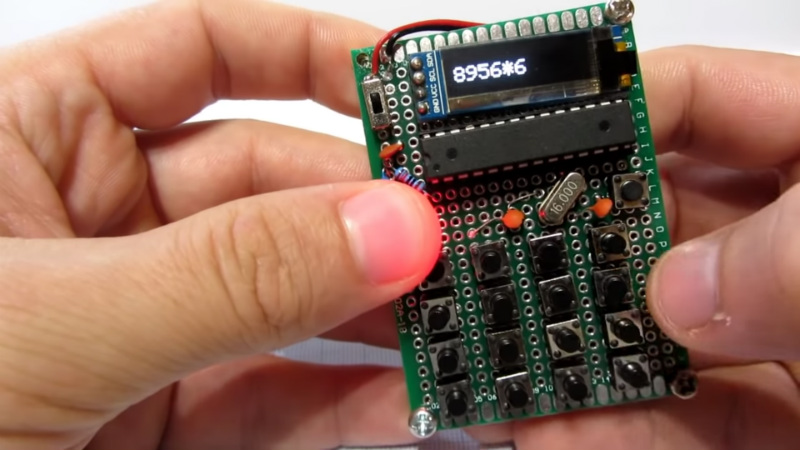We’ve all got calculators on our phones, in our web browsers, and even in the home “assistant” that’s listening in on your conversations all day on the off chance you blurt out a math question is can solve for you. The most hardcore among us might even still have a real calculator kicking around. So in that light, building your own DIY calculator might not seem too exciting. But we can’t deny this Arduino calculator project by [Danko Bertović] would look good sitting on the bench.
 In the video after the break, [Danko] walks us through the creation of the calculator, from placing all the through-hole components to writing the code that pulls it all together. Special attention is given to explaining the wiring, making this is a good project for those just getting started on their digital hacking journey. It also helps that the whole thing is put together on perfboard with jumper wires; no PCB fabrication required for this one.
In the video after the break, [Danko] walks us through the creation of the calculator, from placing all the through-hole components to writing the code that pulls it all together. Special attention is given to explaining the wiring, making this is a good project for those just getting started on their digital hacking journey. It also helps that the whole thing is put together on perfboard with jumper wires; no PCB fabrication required for this one.
For the user interface, [Danko] is using an array of 17 tactile switches for the keyboard and a very crisp 128×32 I2C OLED display. Beyond the battery, a crystal, and a handful of passive components, that’s about all the support hardware it takes to put this project together. You don’t even need an enclosure: a second piece of perfboard and some standoffs are used to sandwich the battery and fragile wiring inside.
Of course, the star of the show is the ATmega328P microcontroller, which is mounted in a place of honor right under the OLED screen. The chip gets programmed in an Arduino Uno and then transplanted into the calculator, a neat trick if you don’t have a dedicated programmer handy. Given how cheap Arduino clones can be had online, this is becoming a more common practice.
The construction of this calculator reminds us a bit of the DIY Sinclair scientific calculator we looked at over the summer. But if you want to see the peak of homebrew calculator technology, this Raspberry Pi powered build is tough to beat.
















“We’ve all got calculators on our phones, in our web browsers, and even in the home “assistant” that’s listening in on your conversations all day on the off chance you blurt out a math question is can solve for you.”
And they don’t give you any backtalk about units!
“The most hardcore among us might even still have a real calculator kicking around.”
*raise eyebrow* I don’t think I’ve ever been described as “hardcore” when it came to calculators. Fuddy-duddy perhaps.
Do you collect old HP calcs too?
Actually…yes, I do.
+1
Or actually, +3 ;)
Still looking for HP {10,11,15,16}C.
And a Curta.
And yes, I know about the new HP clones. :)
When talking about the HP, you probably have to say 1 +
My 11C has been my go to calculator for more than 35 years. Sorry, not for sale! However, if you’re collecting souls, first borns, fondest memories, etc, I’m open to offers.
“When talking about the HP, you probably have to say 1 +”
LOL :)
I have a small collection of calculators as well. I’d love to get a Curta one day. I have many slide rules in my collection.
I have a 16C but you’ll have to pry it from my cold, dead fingers :-). One of my favorite apps on my iPhone is i41x. It’s a faithful HP-41C emulator.
Really cool kids collect polish RPN calculators made by Unitra. They also collect Elwro Junior microcomputers, which are polish ZX Spectrum clones packed into cases taken from kids’ pianos…
“They also collect Elwro Junior microcomputers, which are polish ZX Spectrum clones packed into cases taken from kids’ pianos…”
Are you trying to nerd snipe me?
…it worked.
I don’t have any HP yet, but I do have an old nixie tube Casio 121K that I am attempting to repair. It doesn’t seem to realise that numbers can exist to the right of a decimal point at the moment.
If only genuine uPD101C p-MOS chips were more easy to come by, I might be able to actually get it working one day….
Nice hack, something approachable for beginners and folks who want to make something over the weekend.
The only thing I would change if were to build it is the size of the display and button spacing. Since I grew up using a TI-58
Still very nice project.